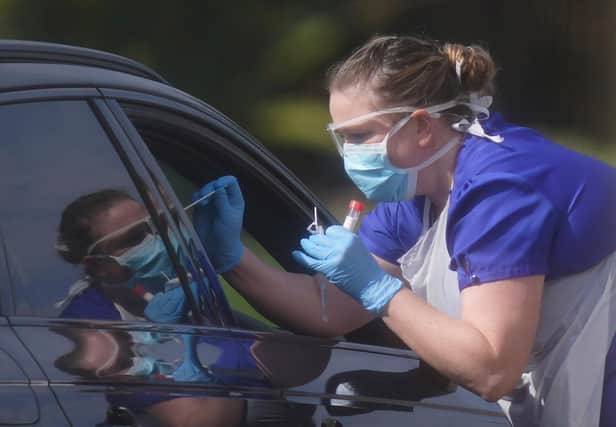Nearly 40 per cent of new Covid-19 cases in Scotland caused by mutant 'highly transmissable' strain


New data released by the Scottish Government as part of the Office of National Statistics’ Covid-19 infection survey states that data analysis indicates 38 per cent of all new cases of Covid-19 in Scotland last week were caused by the new variant.
The new ‘mutant strain’ of Covid-19 has caused concern across the United Kingdom and Europe with France – in an attempt to avoid the strain entering the country – shutting its borders with the UK to all but unaccompanied freight earlier this week, causing significant disruption.
Advertisement
Hide AdAdvertisement
Hide AdConcerns around the high transmissability of the virus have also led to Nicola Sturgeon ordering mainland Scotland to be under level four restrictions – effective lockdown - for a minimum of three weeks from Boxing Day.
The new analysis, released today, comes with a significant caveat that the data should be “treated with caution”, but is based on analysis of what is known as ‘S-Gene dropout’, where a particular gene in the virus is not seen in test swabs.
In the week beginning December 14, the number of tests “compatible” with the new variant of the virus including 38 per cent of positive tests in Scotland.
This is compared with just seven per cent in the week beginning December 7, and up from 14 per cent reported in the week beginning December as part of an ad-hoc release of data.
Advertisement
Hide AdAdvertisement
Hide AdThe survey states: “The new variant of COVID-19 has genetic changes in the S gene. This means the S-gene is no longer detected in the current test, and cases that would have previously been positive on all three genes are now positive only on the ORF1ab and the N gene (not the S gene).
"Absence of the S-gene appears to have become a reliable indicator of the new variation in COVID-19 from mid-November.
"There has recently been an increase in the percentage of positive cases where only the ORF1ab and N genes were found and a decrease in the percentage of cases with all three genes. This information can be used to approximate the growth of the new variant.
"In the latest week, beginning December 14, analysis indicates that tests that are compatible with the new variant of the virus comprise 38 per cent of positive tests in Scotland.”
Advertisement
Hide AdAdvertisement
Hide AdIt puts Scotland just below the UK average (around 46 per cent) for prevalence of the new variant of Covid-19, and below London, the East of England and the South East where the new strain accounts for around two-thirds of all new cases.
Scotland is also below Northern Ireland and the England average, but above the north and midlands of England and Wales.
Despite this increase in the new variant, overall Covid-19 cases in Scotland continue to drop, however the prevalence is still higher than in Northern Ireland.,
In England, around 1 in 85 people are estimated to have the virus, dropping to 1 in 60 in Wales and rising to 1 in 180 in Northern Ireland.
Advertisement
Hide AdAdvertisement
Hide AdAround 1 in 140 people in Scotland, or around 37,100 people, are estimated to have had Covid-19 last week.
The Scottish Government was asked whether the increase in the proportion of new cases attributable to the new strain meant a move to stricter restrictions faster than potentially anticipated.
A Scottish Government spokesperson said: “Protecting public health is paramount and if current arrangements are to be reviewed we will announce this when a decision is made. Small numbers of new variant compatible positives detected in Scotland are leading to considerable uncertainty surrounding these estimates.
“The data suggests that without significant counter measures we could be facing a period of exponential growth, which is why we tightened restrictions over the Christmas period and announced significant additional measures which come into force from Boxing day morning.
Advertisement
Hide AdAdvertisement
Hide Ad“Surveillance to track these and other new variants of the virus continues through the work of the Covid-19 Genomics UK consortium. The Scottish Government has no further details on the location of the cases that are compatible with the new variant as highlighted in the ONS data. There are small numbers of positive test results detected which does not allow us to look at case levels below the national level."
The Scottish Government was also asked whether the rise – more than double – of a variant that is believed to be more transmissable amongst school children would change the arrangements and reopening for schools in January.
The spokesperson added: “Guidance was issued on 21 December regarding the detailed arrangements for schools after the festive break. That guidance provides clarity for learning arrangements through to Friday 15 January.
“From Monday 18 January onwards, our current planning assumption is that schools will be open to all pupils for in-person teaching and learning as normal. However, this will be subject to an assessment of the state of the pandemic in Scotland and any further developments with regard to the new variant in the new year.”
Advertisement
Hide AdAdvertisement
Hide AdThe Scottish Government is under pressure from parent activist groups and the Scottish Conservatives to reopen schools in full on January 18 and Ms Sturgeon has said that will happen “if at all possible”.
However, the First Minister has also stressed that that date for a return should not be considered as set in stone with arrangements continually under review.
A message from the Editor:
Thank you for reading this article. We're more reliant on your support than ever as the shift in consumer habits brought about by coronavirus impacts our advertisers.
If you haven't already, please consider supporting our trusted, fact-checked journalism by taking out a digital subscription.
Comment Guidelines
National World encourages reader discussion on our stories. User feedback, insights and back-and-forth exchanges add a rich layer of context to reporting. Please review our Community Guidelines before commenting.